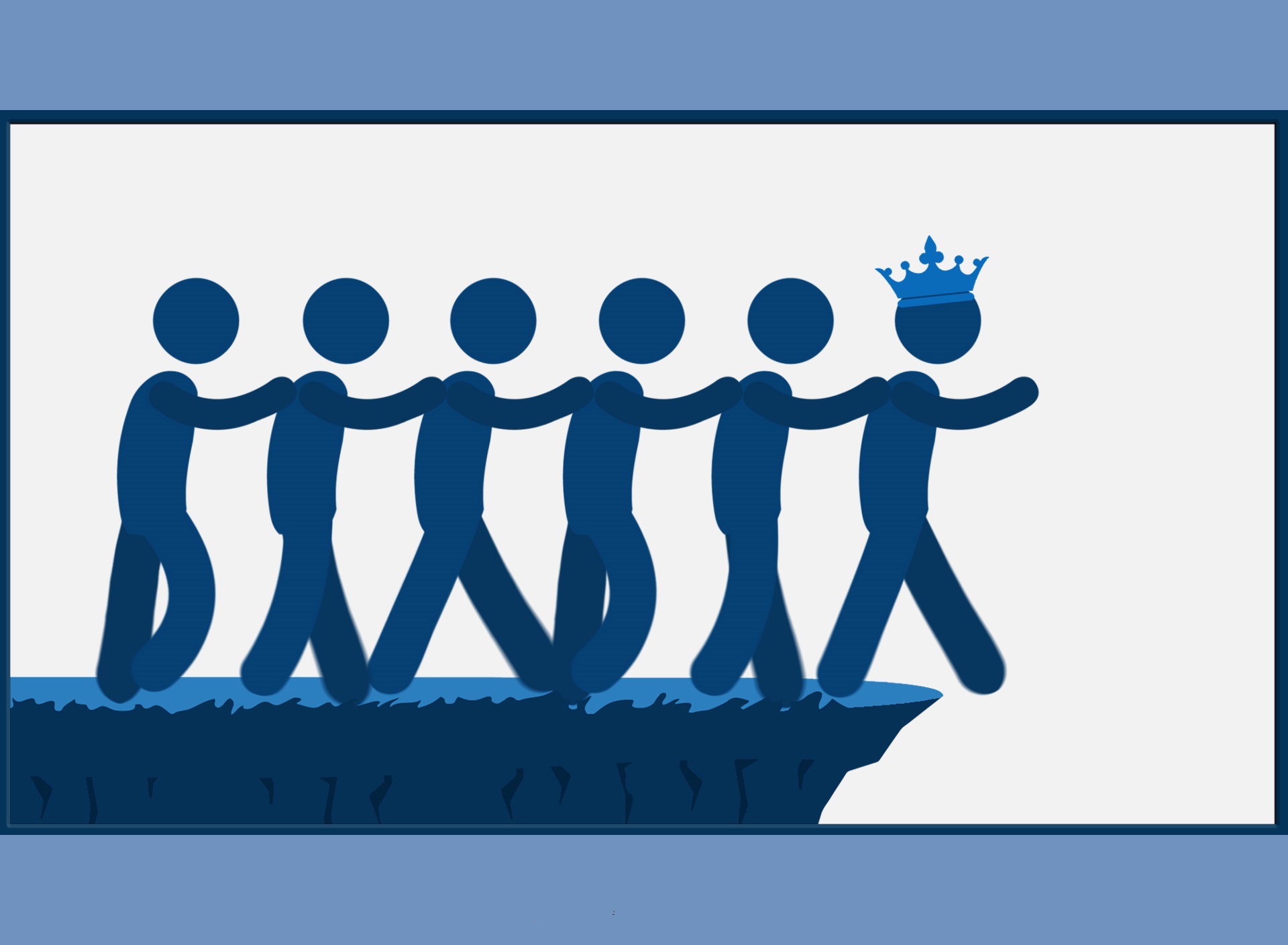It’s the trust in the authority, stupid! (1)
The world is apparently descending into chaos. With events such as the recent collapse of SVB bank adding to the problems allegedly caused by the pseudopandemic and the war in Ukraine, it is easy to feel overwhelmed.
Only a few years ago it was widely recognised that, by nearly every measure, global life outcomes were all improving. Suddenly, we’re all haunted by the spectres of conquest, war, famine and death.

From the cost of living, energy and food crisis, to the threat of a widening international conflict, a climate disaster and now global financial collapse, we seem to be gripped by a global polycrisis. If there is a polycrisis, it is entirely man-made.
The good news is we can build something better if we have the will. We are many and we are powerful, while those who seek to exploit crisis to control us are neither.
We just need to understand the problem: our blind trust in authority.
The Alleged Polycrisis
The world’s economy and its society were not thrown into disarray by a “pandemic,” but rather by the global policy response to an alleged pandemic. Similarly, the war in Ukraine isn’t causing a complete realignment of the International Monetary and Financial System (IMFS), the “regionalisation” of supply chains, an energy crisis or giving rise to a multipolar world order. Once again, it is the “sanctions” and the geopolitical policy response to the war that is throwing the planet, and all of us, deeper into turmoil.
There is no doubt that international chaos is the result of the deliberate actions of policy makers. The only question is if chaos is the intended outcome of their decisions? All the evidence suggestsF that it is.
We can reasonably ask what purpose these so-called “leaders” serve? It seems those we mistakenly trust to make decisions for us are either useless or mendacious.
As pointed out by John Titus, there is no honesty about the true nature of the real global risks we face. The so-called World “Economic” Forum (WEF) released its farcically named Global Risks Report 2023 in which it listed every single risk it could imagine apart from the banking and financial risks—about which it is supposedly “expert”—that really does threaten to destabilise the planet. This risk too is entirely man-made and is the result of the monetary policies of private central banks, notably the Fed and the Bank For International Settlements (BIS).
The WEF, which describes itself as “the International Organization for Public-Private Cooperation,” is among the stalwarts of the Establishment that will never disclose the true “risks.” Prattling on about the “polycrisis” it want’s us all to fear, the WEF, acting as saviour, offers its proposed solution:
“The sheer scale of humanitarian and environmental crises showcases broader paralysis and ineffectiveness of key multilateral mechanisms in addressing crises facing the global order, spiralling downwards into a self-perpetuating and compounding polycrises.
As global risks become more intertwined, preparedness also needs to become more of a shared responsibility between sectors, with local and national governments, business and civil society each playing to their strengths, rather than traditional models of governments addressing market failures when they occur. For example, private-public partnerships can help close key gaps in innovation, financing, governance and implementation of preparedness measures for emerging and well established risks.
Most global risks are ‘owned’ by no one and sit outside the direct control of any one public or private sector entity – meaning many global risks are most effectively tackled through coordinated, global action. Respondents to the GRPS [the WEF’s own risk report] shared their views.
The majority consider national governments, multi-country efforts and international organizations to be the most relevant stakeholders for governing these global risks.”

Unsurprisingly perhaps, the WEF has concluded that the polycrisis it has made up means that “traditional models of government” are no longer of any use. Instead, multilateral mechanisms, via organisation like the UN and its various agencies, such as the WHO and the Wold Bank, should hand global governance over to a global public-private partnership (G3P). The G3P thus affords global authority to banks and other private corporations which, the WEF tells us, will “govern these global risks.”
The good news for the WEF is that every one of its government “partners” agrees. For example, as acknowledged by Presidents Putin and Xi:
“The sides [Russian and Chinese governments] call on all States to protect the United Nations-driven international architecture and the international law-based world order, seek genuine multipolarity with the United Nations and its Security Council playing a central and coordinating role. The G20 format as an important forum for discussing international economic cooperation issues and anti-crisis response measures, in such areas as the international fight against epidemics, world economic recovery, inclusive sustainable development, improving the global economic governance system in a fair and rational manner to collectively address global challenges.”
It seems the Russian and Chinese governments also believe in the polycrisis. They too assert that “international economic cooperation” is essential to combat the multifaceted, crisis of everything.
The G20’s discussion of “international economic cooperation issues and anti-crisis response measures” led to the 2022 Bali Leaders Declaration, which states:
“We designated the G20 the premier forum for global economic cooperation, and today we reaffirm our commitment to cooperate as we, once again, address serious global economic challenges. We met in Bali at a time of unparalleled multidimensional crises. We have experienced the devastation brought by the covid-19 pandemic, and other challenges including climate change, which has caused economic downturn, increased poverty, slowed global recovery, and hindered the achievement of the Sustainable Development Goals.
We will make public investments and structural reforms, promote private investments, and strengthen multilateral trade and resilience of global supply chains, to support long-term growth, sustainable and inclusive, green and just transitions through a greater variety of innovative financing sources and instruments, including to catalyze private investment, to support the achievement of the SDGs.”
The Bali Declaration notes the G20 commitment “to accelerate achievement of the SDGs [Sustainable Develoipment Goals].” The purpose of the WEF’s strategic partnership with the UN is to “accelerate implementation of the 2030 Agenda for Sustainable Development.”
A lot was made of the WEF’s decision to exclude Russian delegates from its meetings and formally cut ties with Russian corporations. This was essentially a PR exercise to convince people that there was some sort of disagreement between the WEF’s stakeholder capitalists and Russia’s. In truth, there is no practical “split.”
The G20’s Declaration, just like the WEF’s risk report, contends that “unparalleled multidimensional crises”—polycrisis—justifies transitioning the world to a system of public-private global governance. The Russian government played a key role in drawing up the Bali Declaration. There is absolute agreement between East and West in this regard.
This is not to suggest that there isn’t genuine disagreement between nations states, or between other G3P stakeholders for that matter. But the conflict arises as they jostle for position within one, proposed global governance system.
The G20’s Declaration enthusiastically promotes Central Bank Digital Currency (CBDC):
“We support continued implementation of the G20 Roadmap for Enhancing Cross-Border Payments. We encourage central banks, other public authorities and the payments industry to continue to work collaboratively on these important initiatives. We also welcome the joint report by the BIS [Bank for International Settlements] CPMI, BISIH [BIS Inovation Hubs], IMF, and World Bank on options for access to and interoperability of Central Bank Digital Currencies (CBDCs) for cross-border payments. We welcome continued exploration of how CBDCs could potentially be designed to facilitate cross-border payments, while preserving the stability and integrity of the international monetary and financial system.”

Unlike the entirely fabricated “multidimensional” – “polycrisis,” CBDC presents a real risk to humanity. The solution to the concocted problem is the actual threat.
Interoperable CBDC “cross border payments” will ensure a single, centrally controlled system of programmable money. Able to determine every aspect of our use of CBDC, if we adopt it, the global network of international bankers that steers the G3P will control our lives.
Our best bet appears to be to protest, lobby or press for reform as best we can. Unfortunately, as we are seeing in France at the moment, public anger at politicians, who continue to make policy decisions in the interests of no one but the parasite class, threatens to boil over. Our only other seemingly available option is to elect another bunch of idiot puppets who will also serve the parasite class and the G3P.
Like the cave dwellers watching shadows on the wall, we are transfixed by controlled illusions leaving us blind to reality. We will never see what is in front of our eyes unless we look in the right direction.
Read the second part of the article
Author: Iain Davis
yogaesoteric
May 28, 2023
